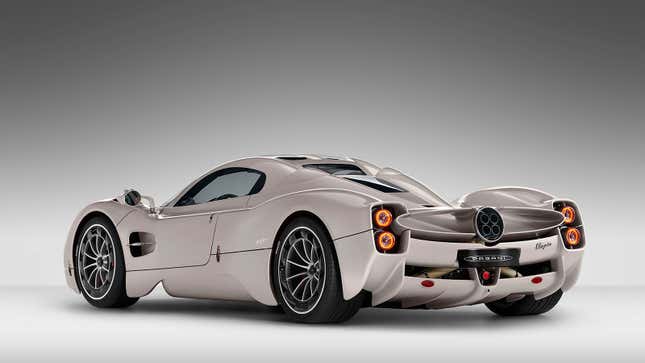Today’s Batteries Are Way Too Heavy For Pagani’s First Electric Hypercar

There’s no use denying it any longer, the electric supercars are coming. Rimac set the stage with its blisteringly quick Nevera EV, McLaren has been teasing its all-electric future, and the bonkers McMurtry Spéirling has been breaking all kinds of records. Now, Italian outfit Pagani has alluded to an EV of its own.
The Pagani Zonda Is a Supercar Classic We’ll Always Love
In an interview with Top Gear, Christopher Pagani, son of company founder Horacio, outlined the firm’s ambitions to go electric over the next decade. In fact, he said that the company has been working towards its first EV since 2018.
But before the car can break cover, Pagani is adamant that one important area must be improved: the batteries.
One day, everything the light touches will be electric. Photo: Pagani
According to Pagani, as well as striking looks and eye-watering performance, one key quality of all of his company’s cars is their low weight. However, as we’ve seen with most EVs that have gone on sale so far, lightweight isn’t exactly a quality they all share. Sure, the Rimac Nevera is fast and fun, but it weighs in at 5,100 pounds. In contrast, a McLaren 720S is nearly 2,000 pounds lighter.
This extra weight is all down to the heavy batteries that are needed to keep an EV running for the range today’s consumers demand. So, if Pagani wants a lightweight EV, it needs to use fewer batteries. And while I’m sure many Pagani owners will never drive their cars far enough to drain the charge, that’s not something the Italian company is happy to sacrifice.
‘The weight is definitely our first question mark,” Pagaini told Top Gear. “So probably, nowadays with the existing technology we cannot create the Pagani the way that we would like to do.”
“[But] there are a lot of amazing things to innovate in an electric car – we’re not afraid of innovation.”

The rear end of the end of Pagani’s V12 cars. Photo: Pagani
According to European Union rules on the sale of gas-powered cars, the Italian firm has until 2035 to “innovate” its way out of the weight challenge it is now facing. Interestingly, it’s tie-in with Mercedes, which currently supplies the V12 engines it fits to the Utopia, could outline a path through the problem.
Last year, Mercedes unveiled its Vision EQXX concept car, which was packed with some super-efficient tech that helped it cover almost 750 miles on a charge. However, that concept was more about range than performance, and only hit a top speed of 87 mph on its drive from Stuttgart, Germany, to Silverstone, UK.



